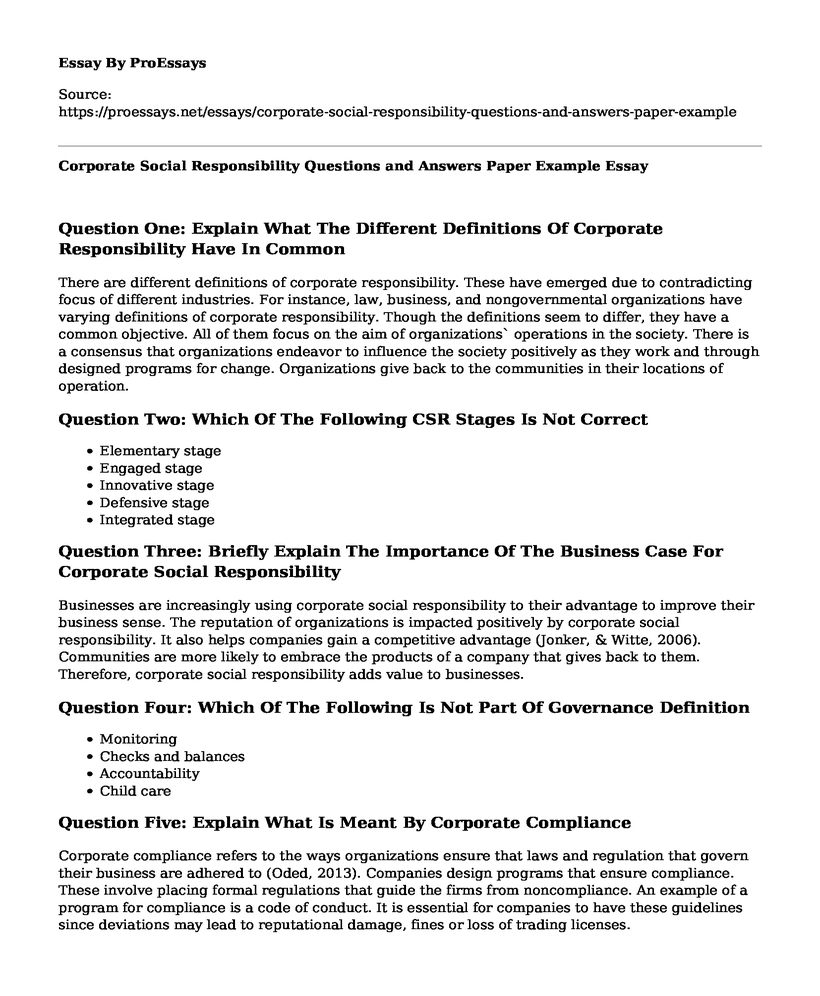Question One: Explain What The Different Definitions Of Corporate Responsibility Have In Common
There are different definitions of corporate responsibility. These have emerged due to contradicting focus of different industries. For instance, law, business, and nongovernmental organizations have varying definitions of corporate responsibility. Though the definitions seem to differ, they have a common objective. All of them focus on the aim of organizations` operations in the society. There is a consensus that organizations endeavor to influence the society positively as they work and through designed programs for change. Organizations give back to the communities in their locations of operation.
Question Two: Which Of The Following CSR Stages Is Not Correct
- Elementary stage
- Engaged stage
- Innovative stage
- Defensive stage
- Integrated stage
Question Three: Briefly Explain The Importance Of The Business Case For Corporate Social Responsibility
Businesses are increasingly using corporate social responsibility to their advantage to improve their business sense. The reputation of organizations is impacted positively by corporate social responsibility. It also helps companies gain a competitive advantage (Jonker, & Witte, 2006). Communities are more likely to embrace the products of a company that gives back to them. Therefore, corporate social responsibility adds value to businesses.
Question Four: Which Of The Following Is Not Part Of Governance Definition
- Monitoring
- Checks and balances
- Accountability
- Child care
Question Five: Explain What Is Meant By Corporate Compliance
Corporate compliance refers to the ways organizations ensure that laws and regulation that govern their business are adhered to (Oded, 2013). Companies design programs that ensure compliance. These involve placing formal regulations that guide the firms from noncompliance. An example of a program for compliance is a code of conduct. It is essential for companies to have these guidelines since deviations may lead to reputational damage, fines or loss of trading licenses.
Question Six: Corporate Governance Is Not About
- Control/supervision
- Execution management
- Direction
Question Seven: The Corporate Board Is Responsible For Day To Day Management Of A Company
True or False
Question Eight: Which Of The Following Is Not A Company Stakeholder
- Clients
- Employees
- Shareholders
- Competitors
Question Nine: Explain The Purpose Of Corporate Governance
Corporate governance is the processes and practices by which organizations are directed. Companies use corporate governance to outline rules and regulations of operations to employees. Large companies adopt corporate governance more than small companies. Since the guidelines are stipulated, these organizations manage to streamline their operations, therefore, increasing productivity (Monks & Minow, 2011). It also gives staff a guide to work. Companies are able to detect deviations in operations and correct them promptly. Disciplining of noncompliant employees is also made easy.
Question Ten: What Is Not A Measure Of Corporate Social Responsibility
- Staff satisfaction
- Productivity
- Compliance with regulations
- Nr of health and safety incidences
References
Jonker, J., & Witte, M. C. (2006). Management models for corporate social responsibility. Berlin: Springer.
Monks, R. A., & Minow, N. (2011). Corporate governance. Chichester: John Wiley & Sons.
Oded, S. (2013). Corporate compliance: New approaches to regulatory enforcement. Cheltenham: Edward Elgar.
Cite this page
Corporate Social Responsibility Questions and Answers Paper Example. (2022, Sep 22). Retrieved from https://proessays.net/essays/corporate-social-responsibility-questions-and-answers-paper-example
If you are the original author of this essay and no longer wish to have it published on the ProEssays website, please click below to request its removal:
- Jobs or Occupations That My Family Members and I Have Held. Essay Example.
- Paper Example on Motivation of Heritage Students in Foreign Language Classrooms
- Role of the Nutrition Manager Essay
- Personal Beliefs and Values: Nursing Essay Example
- Essay Example on Pro Sports: Big Money, Big Opportunities
- Paper Example on Occupational Safety & Health: Ensuring Workplace Wellbeing
- Research Paper on Outsourcing for Long-Term Care Facilities: Benefits & Considerations







